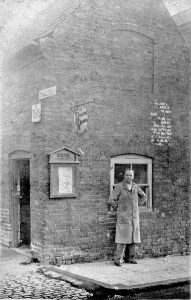Road Transport

Wagonette – Watkin Family of Jug and Glass 1900
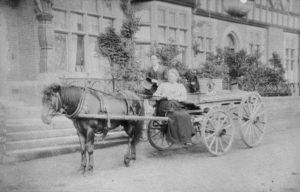
Dukeries Hotel c1900 Mr and Mrs Atkinson.
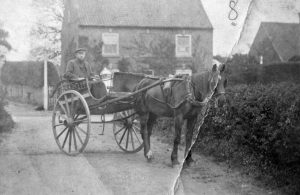
Photo of J Torr, carrier East Lane
Although the carrier’s cart still lumbered along the uneven road to Mansfield and took between 1½ and 2 hours on the journey, more and more people would make their way to newly built railway station.
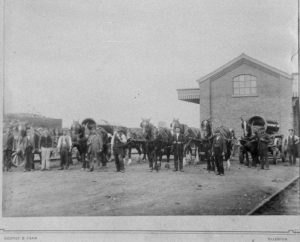
Edwinstowe station goods yard. n.d.
In November 1921, the Mansfield Reporter stated that “A reliable DAILY MOTOR BUS SERVICE between MANSFIELD, CLIPSTONE, EDWINSTOWE AND OLELRTON was now running departing from Mansfield, Westgate.”
Various bus companies provided public transport services on routes which enabled passengers to visit Mansfield, Nottingham, Worksop, Doncaster, Retford and Sheffield. These were Wass Brothers, Ebor, East Midlands, Trent Bus Company and Mansfield & District Traction Company also Beauchief coaches.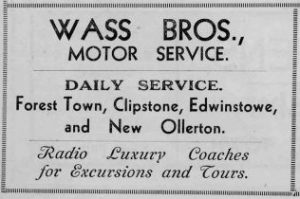
J Lacy’s cobbler’s shop. High Street. Ebor timetable on wall. n.d.
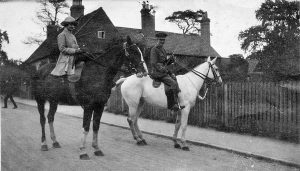 Church Street – WW1
Church Street – WW1
Upper Village and entrance to the forest, at the side of the Wheelwrights and Launay’s Restaurant. The cottage in the background is the residence of Margaret Woodhead – 2020. An officer and his wife on the G.O.C. staff for Clipstone Camp. Stabling for horses was provided at Edwinstowe. Some officers lived or spent time in accommodation away from the camp.
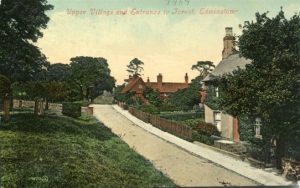
Entrance to Forest (Church Street) 1907
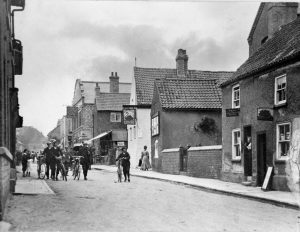
Photo of High Street in Edwardian days.
By then the bicycle was a common popular way of getting about.
Mike Jackson when writing “The Story of a Forest Village” mentioned that two of the earliest cycles recalled in Edwinstowe had wooden rimmed wheels and were possibly supplied by Hibbs and Buckingham of Ollerton. Solid rubber tyred models, including penny farthings were laboriously pedalled along local roads and byways though by the end of the century most cycles had pneumatic tyres. One local writer declaimed “the difficulty now is to find a non-rider, and the bicycle seems to be almost as necessary to the average man and woman as a pair of boots”.
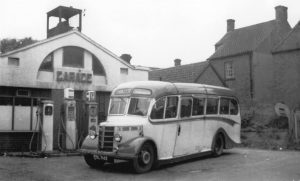
Morley’s Coaches n.d.
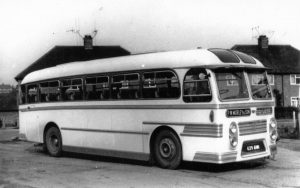
PW Morley & Son Coach
acknowledgement – Brian Botley
Morley’s Buses
Before car ownership, the bus was the only means of seeing life outside the village.
I am sure that there are many who will remember the trips organised by various organisations and individuals during the 40s, 50s and 60s. Holidays to Blackpool and Yarmouth were organised for many years, starting at the Club. I seem to remember that these were organised by Mr Ray Ward. Cricket followers hired Morley’s buses to go to Trent Bridge. During the 50s, Â a regular Saturday night bus picked up the young folk from Ollerton, Edwinstowe and Bilsthorpe, for an evening at the Astoria, or Palais in Nottingham. What happened to those lovely comfortable buses?
Whilst on holiday in Malta in 1980, I was sitting at a bus station and glanced at a bus that seemed rather familiar. I walked round the back of the bus, and I could see quite clearly, underneath a coat of paint, P.W. Morley and Son.
Acorn Newspaper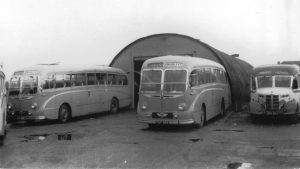
Edwinstowe Garage & Morley’s Coach on Boy Lane – 1950’s
acknowledgement – Brian Botley
(Boy Lane – meaning a short track or road that goes nowhere)
Maritime Links
A search through old newspaper reports can often result in interesting news. This happened recently when one of the Society’s researchers discovered that in the early 1800’s one of a Newcastle shipbuilder’s vessels was named “Edwinstow”. The 1801-1802, Martime records the Edwinstow as belonging to J Douglas. It was a prize vessel and a tender (a small boat that runs back and forth to a bigger boat or ship because it tends to the needs of larger crafts). The captain was W Rowe. In 1803, she was licensed by the East India Company as a whaler to proceed to the Southern Whale Fishery. The following year she was reported whaling in the Pacific before being detained by the Spanish at Concepcion and sold as a prize. Final reports note that she “burnt” in 1807. During her life she had acted as a tender to a convoy carrying the 65th regiment of foot, (2nd Yorkshire, North Riding) destined for foreign service, and on one occasion rescued survivors from sinking ships caught in a gale in the Bay of Biscay.
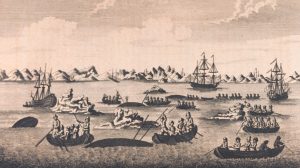
One might question why a vesse l from Newcastle would bear the name “Edwinstow”. Perhaps it may have been due to the fact that Newcastle once formed part of Northumbria – its King was Edwin. He marched south to fight King Penda of Mercia and was killed at the battle of Hatfield, possibly near Edwinstowe, at a small hamlet called Cuckney, in AD 632. In AD 633 Edwinstowe (Edenstou) which was a small settlement within the forest bounds, was named after King Edwin of Northumbria.
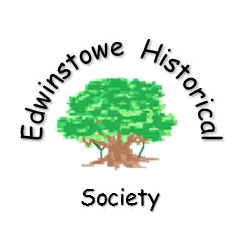 Edwinstowe Historical Society
Edwinstowe Historical Society